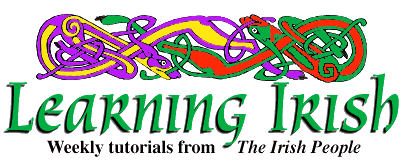
Irish Lesson 15
|
PRONUNCIATION The Letter "s" in Irish is sounded (s), as Americans pronounce "s" in "sun", if the nearest vowel in the word is "a", "o", or "u". This is the broad "s". Try: sál (saw*l), saol (say*l), só (soh), solas (SUH-luhs), sú (soo), súil (SOO-il). If "s" is next to an "e" or an "i", pronounce it (sh), like the "sh" in English "shawl". This is the slender "s". Examples: sean (shan), séid (shay*d), seilide (SHEL-i-de), sín (sheen), siar (SHEE-uhr). If another consonant is between the "s" and the "e" or "i", the broad sound may be heard. For example: smig (smig), spéir (spay*r), srian (SREE-uhn), stríoc (streek). Remember that "is" is an exception. Always say (is), never (ish), and of course never (iz). GRAMMAR We return to "tá" this week, following your introduction to "is". Before we take up the new work, review "tá" quickly by reciting "tá mé, tá tú, etc. Níl mé, níl tú, etc. An bhfuil mé, an bhfuil tú, etc. Nach bhfuil mé, nach bhfuil tú, etc." Review lessons 4 to 6 if you have forgotten any of this. It is vital to know. To say the equivalent of "I am reading" in Irish, we add a word called a verbal noun to "tá mé", with the preposition "ag", meaning "at", before the verbal noun. Learn these examples: Tá mé ag léamh (taw* may* uh LAY*-uhv), I am reading. Níl sé ag scríobh (neel shay* uh shkreev), He is not writing. An bhfuil siad ag imeacht? (un vwil SHEE-uhd eg im-AHK*T), Are they departing? Nach bhfuil tú ag éisteacht? (nahk* vwil too eg AY*SH-tyahk*t), Aren't you listening? Pronounce the "ag" as (uh) before a verbal noun starting with a consonant, and as (eg) before a verbal noun starting with a vowel. This grammar form serves as in English--to show that an action is going on at present. There is also a way, as in English, to say that an action takes place off and on but may not be going on now. To understand the difference, compare "I am walking" with "I walk". A few verbs do not follow this pattern.. Irish is much like English in this. In Irish we say: "I understand you", not "I am understanding you". "I see it", not "I am seeing it". "I hear him", not "I am hearing him". The first part of a verbal noun nearly always looks and sounds somewhat like the imperative of the verb, although the verbal noun is usually longer and has an added syllable. From now on, learn the verb's imperative and verbal noun together, as in the vocabulary below. The term "ag léamh" (uh LAY*-uhv) literally means "at reading". "I am reading a book" becomes "I am at reading of a book". The word "book" in this form takes a slightly different look and pronunciation from the one you have learned, (LOU-wuhr). It changes to "leabhair" (LOU-wir), the genitive case. We will introduce you to this by the phrase method, so that you will have a good background and an inventory of examples by the time we begin studying how nouns change. REFLEX EXPRESSIONS Learn these expressions for quick use in thought and speech: Más é do thoil é (MAW* shay* duh HIL ay*), Please. Go raibh maith agat (gu-ruh MAH huh-guht), Thank you. Fáilte romhat (FAW*L-tye ROH-uht), Welcome to you. Go sabhála Dia sinn (goh suh-VWAW*-luh DEE-uh shin), May God save us. VOCABULARY téigh, ag dul (tay*, uh DUHL), go tar, ag teacht (tahr, uh TYAHK*T), come scríobh, ag scríobh (shkreev, uh SHKREEV), write ith, ag ithe (i, eg I-he), eat imigh, ag imeacht (IM-ee, ag im-AHK*T) depart, leave ól, ag ól (ohl, eg OHL), drink faigh, ag fáil (feye, uh FAW*-il), get déan, ag déanamh (day*n, uh DAY*N-uhv) do, make siúil, ag siúl (SHOO-il, uh SHOOL) walk rith, ag rith (ri, uh RI) run éist, ag éisteacht (ay*sht, eg AY*SH-tyahk*t) listen foghlaim, ag foghlaim (FOU-lim, uh FOU-lim), learn fan, ag fanacht (fahn, uh FAHN-uhk*t), wait CONVERSATION Diarmaid (DEER-mwid): A Dhóirín, tá sé ag éirí dorcha (uh GOH-i-reen, taw* shay* eg EYE-ree DUHR-uh-huh). Cá bhfuil Una? (kaw* vwil OON-uh) Jerry: Doreen, It's getting dark. Where is Una? Dóirín (DOH-i-reen): Níl a fhios agam (neel is uh-GUHM) cad atá sí a dhéanamh (kahd taw* shee uh YAY*N-uhv). I don't know what she is doing. Fan nóiméad go bhfeicfidh mé (fahn NOH-may*d go VEK-hee may*) Wait a minute until I see. Go sabhála Dia sinn! (goh suh-VWAW*-luh DEE-uh shin) May God save us! Tá sí ag siúl amuigh i lár na sráide! (taw* shee uh SHOOL uh-MWEE i law*r nuh SRAW*-de) She's walking out in the middle of the street! Diarmaid: Agus tá na gluaisteáin ag dul thairis (AH-guhs taw* nuh GLOOSH-taw*-in uh duhl HA-rish). And the autos are going past her. Téigh amach agus faigh í (tay* uh-MAHK* AH-guhs feye ee). Go out and get her. Dóirín: Tá mé ag dul amach go díreach anois (taw* may* uh duhl uh-MAHK* goh dee-RAHK uh-NISH). I going out right now. Nach díol trua mise? (nahk* DEE-uhl TROO-uh MISH-e). Isn't it an object of pity that I am? (c) 1997 The Irish People. May be reprinted with credit. |